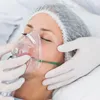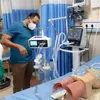Coronavirus: Healthtech startup Avyantra focusses on first-level respiratory therapy
Hyderabad-based Avyantra Health Technologies has developed a Continuous Positive Airway Pressure (CPAP) product, which enables non-invasive ventilation in coronavirus patients with low to medium risk.
The coronavirus crisis has led to an increased demand for ventilators, and India is heavily lacking on this front.
Hyderabad-based Health Technologies is looking to meet low to medium-level ventilation requirements of the coronavirus patients.

Avyantra Co-founders - Hyma Goparaju and KVKLN Rao. Credit: Avyantra Health Technologies
Founded in 2017 by KVKLN Rao and Hyma Goparaju, Avyantra Health Technologies has developed a Continuous Positive Airway Pressure (CPAP) product. It is the first-level respiratory therapy given to patients with respiratory distress.
Speaking to YourStory, Hyma explained that CPAP was especially helpful for elders and children as it was non-invasive and offered effective ventilation in a comfortable manner.
For the uninitiated, invasive ventilation involves placing a tube in the patient’s trachea (windpipe) under sedation to help in breathing. This can only be done by doctors and healthcare professionals. On the contrary, non-invasive ventilation involves a small and portable device, which requires the patients to wear masks around their nose and mouth.
How can it help coronavirus patients?
Hyma said CPAP has been approved by the Food and Drug Administration (FDA).
“Existing ventilators provide invasive ventilation, which is not required in most cases. There is a need for a huge amount of non-invasive ventilation as well because invasive ventilation, which puts a lot of pressure on the lungs, can cause damage to the lungs that are already under distress,” Hyma said.
She explained that doctors can do away with invasive ventilation for almost two-thirds of the coronavirus and SARS cases. The CPAP device can be used by a patient by using a nasal or face mask. A specific mask, called respiratory hood or helmet mask, is used to treat coronavirus patients to prevent aerosolisation.
“CPAP therapy can be delivered easily, with minimal training, even by nurses and healthcare volunteers. It can also be offered as home therapy,” Hyma added.
While CPAP is easier to use and can be done without the help of medical professionals, normal invasive ventilation is not only a complex process but also involves incubation of the patients and administering of anaesthesia.
According to Hyma, most coronavirus patients may not need ventilation to that extent. She explained that CPAP was successful in treating SARS patients across China and Thailand during the outbreak in the past. “In some regions across the globe, CPAP was tried on coronavirus patients and they found that they could stabilise the patients early on.”
Prototype ready for deployment
Recently, Avyantra was nominated by Bengaluru-based incubator Centre for Cellular and Molecular Platforms (C-CAMP) as deployment-ready coronavirus innovation.
Hyma said the CPAP prototype was ready and the company needed to obtain regulatory clearance. Meanwhile, the Indian Council of Medical Research (ICMR) has approved the product. Hyma explained that the company also customises the product’s mask to treat coronavirus patients.
She said the product will be rolled out as soon as it receives regulatory clearance.
Hyma added that they were in talks with doctors and healthcare professionals while developing the product, and realised that the demand for CPAP ventilation existed. “The demand is there, we only need to roll out the product.”
Edited by Javed Gaihlot









